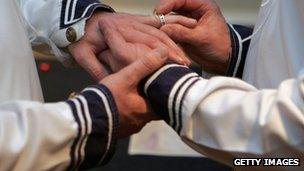Government defends gay marriage law change plans
- Published

The government says the fears of the Church are unfounded
Downing Street has defended plans to change the status of civil ceremonies to allow gay and lesbian couples in England and Wales to get married.
It said it was confident safeguards to stop religious organisations being forced to take part in services would not be overturned by European courts.
The Church of England has said the move would "alter the intrinsic nature of marriage as the union of a man and a woman".
Ministers plan to pass the law by 2015.
In its 11 June response to a consultation, external on the issue, the Church of England said plans to exempt religious organisations from performing gay marriages would be unlikely to survive legal challenges in domestic and European courts.
However, Home Secretary Theresa May has said she believes ministers can create safeguards to protect the concerns expressed by religious groups.
"The government is not going to ask anybody to do anything that is against their conscience," she said.
"We want to ensure that we can put into place a framework that makes sure that those people who don't want to host same-sex marriages are not required to do so."
Civil partnerships were introduced in 2005 to give same-sex couples the same legal rights as married couples, but the law does not allow such unions to be referred to as marriages.
The government rejected the Church of England's assertion that the consultation exercise, which closes on Thursday, was "flawed, conceptually and legally".
Downing Street said the government welcomed the submission by the Church of England and would carefully consider it.
But the prime minister's spokeswoman confirmed that the government still intended to legislate on gay marriage by the end of this parliament.
"It is the government's view that marriage is one of the most important institutions we have got," she said.
"The consultation paper makes very clear that no religious organisation will be forced to conduct same-sex marriages as a result of our proposals."
She added that the government had taken legal advice on the likelihood of a challenge to the European court before drawing up its proposals and that Tory MPs, some of whom had expressed opposition to the plans, would be given a free vote.
Meanwhile, the National Secular Society said it was "incorrect" for the Church of England to "usurp Parliament's power" by claiming it could not redefine marriage.
"The Church's case rests on the risible proposition that introducing same-sex civil marriage will render the Church vulnerable to a European Court forcing it to conduct same-sex religious marriages too. The freedom of religion provisions, however, would ensure this could never happen," it said.
Gay rights campaign group Stonewall described the latest concerns raised by the Church of England as "scaremongering"
The Catholic Church in England and Wales has urged people to sign an online petition organised by the Coalition for Marriage.
More than 550,000 people have so far signed the petition set up by the "umbrella group of individuals and organisations in the UK that support traditional marriage and oppose any plans to redefine it".
- Published4 June 2013
- Published12 June 2012
- Published21 April 2012
- Published15 March 2012
- Published15 March 2012
- Published11 March 2012